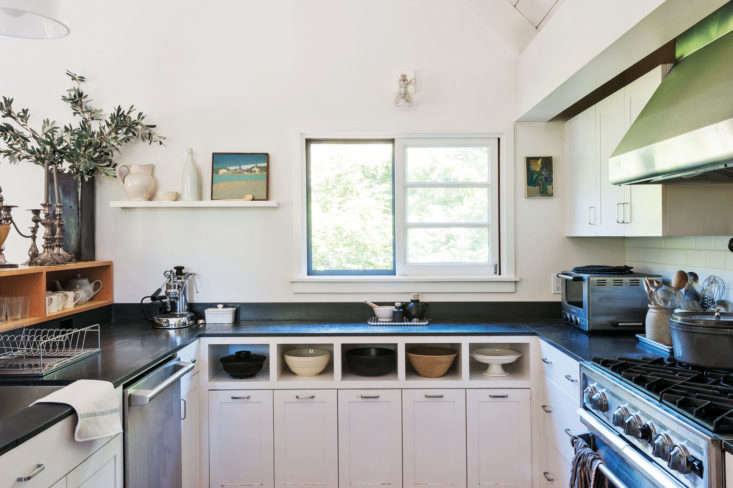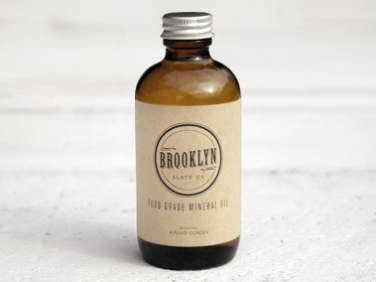Paper as a countertop material? Sounds suspect—and soggy—but think again. When combined with a few key ingredients, heated, and compressed, paper turns into a material that is stone-like in appearance and durability, but softer and more forgiving. Originally designed for use in skateboard parks, science labs, and marine environments, paper composite countertops have proved that they have muscle, and are an excellent, affordable, eco-friendly alternative to solid-surface plastics and stone. Should paper-based countertops be on your short list?

What are paper composite countertops?
Paper composite countertops are made of paper (or wood-based fibers), natural pigments, and non-petroleum-based resins. These materials are mixed, compressed, and baked at very high heat to create dense, durable, nonporous monolithic slabs.

What are the benefits of using paper composite counters?
Paper composite has an appeal similar to solid-surface composite (Corian), but with an earth-friendly bent. In particular, paper-based composite counters are:
- Environmentally friendly. The majority of the paper content is postconsumer recycled or comes from FSC-certified, sustainably harvested forests.
- Easy to install. Paper composite is lighter than stone and can be cut and shaped with ease.
- Able to be joined with tight, clean seams. While not invisible, the seams are much cleaner than what can be achieved with stone countertops.
- Dense and durable. Paper composite counters are harder than wood yet more forgiving than stone.
- Nonporous. The material is impervious to water, won’t harbor bacteria, and is stain resistant.
- Appropriate for indoor and outdoor applications. Paper composite counters can stand up to weather.

Who makes paper-based countertops?
The two key manufacturers of paper composite material are Richlite and Paperstone. They differ slightly in their ingredients, recipes, and resulting colors. Two additional products to consider are Trespa and Kliptech EcoTop. Used in scientific and medical laboratories, Trespa TopLab countertops are made of thermoset resins with cellulose fiber reinforcement and are exceptionally stain resistant and durable. Kliptech makes a partially paper-based countertop, EcoTop, which is a blend of bamboo fibers, recycled demolition wood fibers, and recycled paper bound together with a VOC-free, water-based resin.


What colors are available?
The type of resin used to make paper-based countertops is dark and causes the resulting color choices to be limited to a range of medium to dark hues, all in a matte finish. They will darken slightly over time with exposure to UV rays.



How do you clean and maintain paper composite counters?

For day-to-day cleaning, use a damp cloth or sponge to wipe the surface. Skip the soap—alkaline soap, such as regular dish soap, will gradually dull the surface. With stubborn stains, try a nonabrasive household cleaner (avoid using bleach products). Plain yogurt can be used to pull stains from lighter colored material.
It’s important to note that paper composite counters are only heat resistant to 350 degrees: Hot pads or trivets are a must to avoid burning the surface. That said, surface nicks, scratches, and scorch marks can be sanded out of the top with an abrasive pad and then finished with food-safe mineral oil.

How much do paper composite countertops cost?
Comparable to other solid-surface composite countertops in price, paper-based countertop slab is in the low-to-mid price range of worktop materials, running between $30 to $80 per square foot installed. Price varies depending on the complexity of the installation, the thickness of the slab, and the cost of installation labor in your area.

Paper Composite Countertop Recap
Pros:
- Durable work surface
- Warmer and more forgiving than stone
- Made from recycled and environmentally sustainable materials
- Stain- and nick-resistant
- Easy to install
- Impervious to moisture, won’t harbor bacteria
- Affordable
- Easy to clean
- Will develop a patina over time
Cons:
- Heat resistant to 350 degrees; can scorch
- Limited color palette
- Not recyclable due to resin content, but can be recut and reused
- Will develop a patina over time
Researching new countertops? Read 5 Questions to Ask When Choosing Your Kitchen Countertops. And for more specifics, see:
- Remodeling 101: Butcher Block Countertops
- Remodeling 101: Concrete Countertops
- Remodeling 101: Soapstone Countertops
- Remodeling 101: Stainless Steel Countertops
- Remodeling 101: Marble Countertops
- Remodeling 101: Engineered Quartz Countertops
- Remodeling 101: Corian Countertops (and the New Corian Look-alikes)
Finally, get more ideas on how to evaluate and choose your kitchen countertop in our Remodeling 101 Guide: Kitchen Countertops.
N.B.: This post is an update; the original story ran on September 2, 2016.





Have a Question or Comment About This Post?
Join the conversation (7)